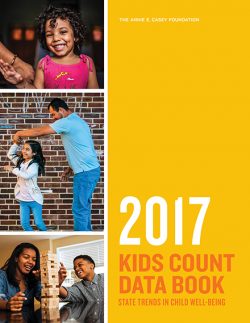
Ranking 47th in the latest national rankings in economic well-being, Arkansas continues to struggle with poverty that affects its children, according to the 2017 KIDS COUNT® Data Book released today by the Annie E. Casey Foundation.
More than one in four (27 percent) of Arkansas children still live in poverty, compared to the national average of 21 percent.
“We have a long way to go, and must encourage lawmakers to enact sound tax and budget policies, like a state-level earned income tax credit (EITC), so that Arkansas families can find a permanent solution out of poverty,” said Rich Huddleston, executive director of Arkansas Advocates for Children and Families.
See the entire 2017 Kids Count Data Book here.
See Arkansas-specific data here.
The 2017 KIDS COUNT Data Book uses 16 indicators to rank each state across four domains — health, education, economic well-being, and family and community — that represent what children need most to thrive. Arkansas ranks:
- 35th in education. This domain examines the percentage of children ages 3 and 4 not attending school, fourth graders not proficient in reading, eighth graders not proficient in math and high school students not graduating on time.
- 44th in family and community. This domain examines the percentage of children living in high-poverty areas, single-parent households, and education levels among heads of households, as well as teen birth rates.
- 46th in health. The health domain looks at the percentage of children who lack health insurance, child and teen death rates, low birthweight babies and alcohol or drug abuse among teens.
- 47th in economic well-being. The economic well-being domain examines data related to child poverty, family employment, housing costs and whether older teens not in school are working.
Despite these discouraging rankings, there are a few bright spots in this year’s data. For instance, 95 percent of Arkansas children have health insurance. This is an all-time high and shows continuous improvement over the past five years. We also had fewer 3- and 4-year-olds not attending preschool in 2015 than we did in 2014, putting us in 14th place for this indicator.
Both of these improvements are products of sound policy choices, including ARKids First —established in 1997 by former Govenor Mike Huckabee — a turning point to positively alter the health care landscape for Arkansas’ children. This policy has had far-reaching impacts into other areas of their lives, including education.
The rise in the number of Arkansas 3- and 4-year-olds attending pre-K is due in part to a $1 billion federal funding boost for U.S. preschool programs. Announced at the end of 2014, the additional funding has allowed Arkansas to expand pre-K access to more children.
Learn more about the public policies that can improve our child well-being here.
“Our economic well-being numbers reflect policy choices, such as the decision by lawmakers not to adopt a state-level Earned Income Tax Credit (EITC),” said Huddleston. “An Arkansas EITC would supplement the wildly successful federal version which helps working families across the nation make ends meet with credits at tax time. The credits are usually spent on catching up on bills, furthering education, or providing essentials for kids. Considering the state’s high child poverty rate and other dismal economic well-being indicators, it’s time to pull the trigger on a state EITC.”
To read more about the national and state-level data, click here.
For a handy comparison of this year’s state-level data to last year’s, click here.
